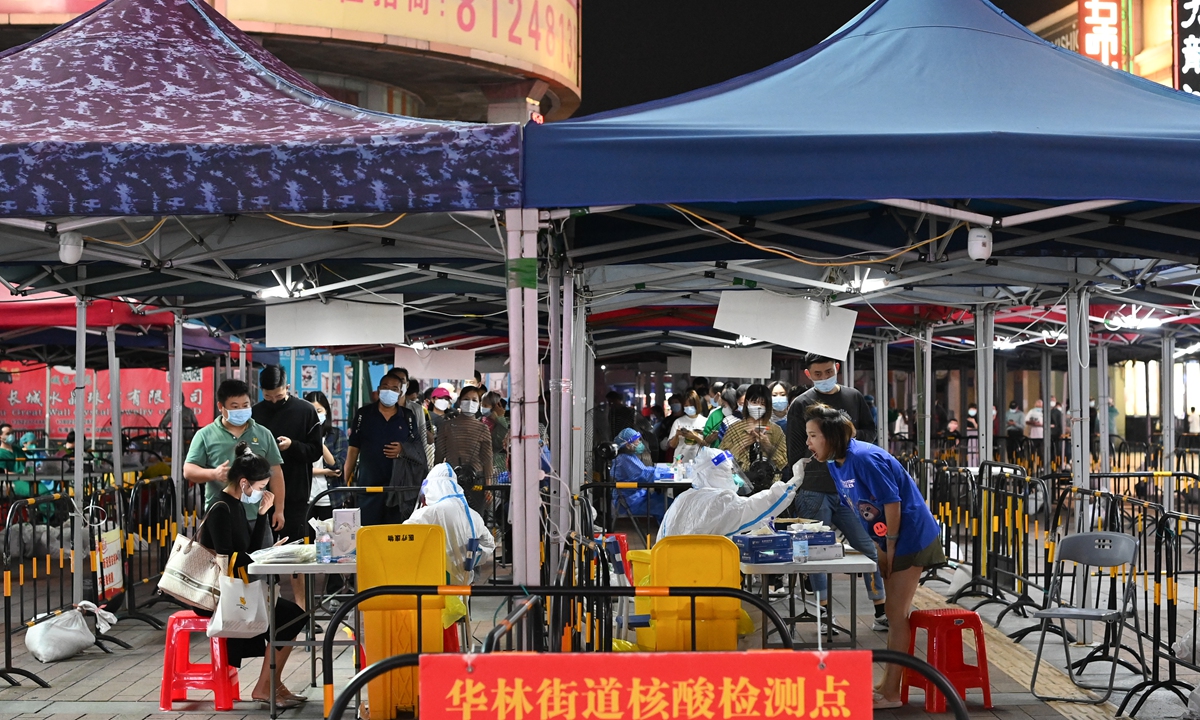
Residents in a community in the Liwan district in Guangzhou, South China's Guangdong Province, take nucleic acid testing on November 9, 2022. Photo: VCG
China's southern metropolis Guangzhou has been suffering its "most complicated and severe" COVID-19 epidemic in three years, with the number of newly infected cases surging since November to exceed 12,000.
According to data released Thursday by the Guangzhou Health Commission, the city on Wednesday found 2,555 local infections, among which 125 were confirmed cases and 2,430 were asymptomatic patients, lifting the total number since November to 12,846. Among the 2,555 cases, 2,444 were found in one district - Haizhu, accounting for over 95 percent of the daily cases in the city.
In response to the surge in infections, most schools except those in three districts - Nansha, Conghua and Zengcheng - were requested to close on Thursday and conduct online courses. Colleges and universities as well as senior students in senior high schools have been put under closed-loop management.
Airports in Guangzhou saw widespread flight cancellations on Wednesday and Thursday.
The source of some sporadic positive cases was not clear, and the risk of community transmission was high, the local health commission said at Thursday's press conference. Also, the epidemic situation in Liwan district showed sporadic distribution and local cross infections, according to the health authority.
Guangzhou health officials said that the city is facing its "most complicated and severe epidemic situation of the past three years."
Infections have now burst out in multiple points and most of them were concentrated in Haizhu district, Zhuang Shilihe, a Guangzhou-based medical expert who closely follows public health issues, told the Global Times on Thursday. The expert noted that as Guangzhou is a factory and transportation hub, it is hard for the city to control the epidemic.
But the expert believes there is no need to adjust entry control measures for the time being.
After China shortened the quarantine period for people entering the country from overseas to "7+3" days in the middle of this year, some voices attributed the latest surge in Guangzhou infections to the border entry measures, arguing that it would be better to extend the quarantine time.
In response, Zhuang said the "7+3" quarantine policy had been introduced as the incubation period of Omicron has shortened and there is no evidence at present to support the claim that the latest outbreak was due to the shortened quarantine period.
Zhuang noted that increased indoor activities since autumn are one of the factors that cause more cross infections.
As winter approaches, not only Guangzhou, but also other areas across China are facing mounting pressure in fighting the epidemic, with more COVID-19 strains with greater immune escape capabilities emerging to breach the vaccine's protective barrier, the expert warned.
Although the latest outbreak in Guangzhou slowed down the pace of the metropolis, most local residents still felt the city's strong management abilities and humane care.
Daily supplies and medical resources are still sufficient, anti-epidemic measures are targeted and dynamic and the one-size-fits-all approach in controlling the epidemic is barely seen, according to local residents reached by the Global Times on Thursday.
A resident surnamed Liu, who lives in Yuexiu district, said that she went to the office every day even though her company required daily nucleic acid testing for about a month. Liu said she can easily purchase goods and see a doctor.
However, most of her friends who live in Liwan, Haizhu and Panyu districts have been requested to work from home, Liu said.
Although some communities have been closed and dine-in is mostly not allowed, another resident surnamed Yin said he felt reassured as there are enough basic goods and supermarkets are open.
There is no panic around him, and the impact of the epidemic on him is small, said Yin, who still expresses hopes of things returning to normal as soon as possible.
The Guangzhou-based medical expert Zhuang also said, "Daily life is so far going smoothly."
Despite the mounting pressure, the city is following a scientific and people-oriented principle during the epidemic, Zhuang said.
Guangzhou has seen a limited impact on logistic and trade so far thanks to the local government's launch of dynamic epidemic control measures to bring down the possible impact of the outbreak and quick reining of the virus to stop it from further spreading, industry experts told the Global Times.
A Guangzhou-based trader noted that his company's warehouse is not based in some high-risk area, a possible reason for its operations having remained unaffected.
Despite the pressure from the epidemic, Guangzhou port's trade business shows a steady growth. As of the end of October, the port had operated 35 sea-rail combined transports, with the number of containers delivered by the transports exceeding 200,000, a year-on-year increase of 54.5 percent, according to the port.




